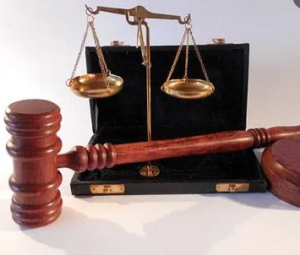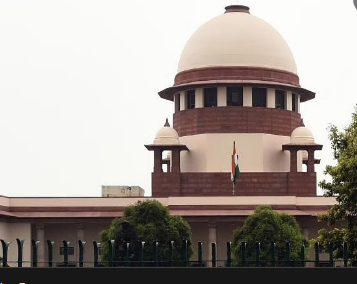The Indian Constitution provides that the Union Government shall be composed of the executive, the legislature, and the judiciary and the executive powers are vested by the constitution in the prime minister, parliament, and the Supreme Court, respectively. The legislature i.e. Parliament is responsible for preparing policies and law-making activities. The executive is responsible for implementation of the laws created by the legislature of the country. The judiciary is an independent system and  not directly connected to the legislature or the executive. It is an independent judicial system across the nation at different levels that is vested with judicial powers and can carry on judicial functions without any kind of direct interference from the government i.e legislature and the executive.
not directly connected to the legislature or the executive. It is an independent judicial system across the nation at different levels that is vested with judicial powers and can carry on judicial functions without any kind of direct interference from the government i.e legislature and the executive.
The judiciary is actually the heart of our nation in many ways and is closest to the citizens of the nation. The many functions of the judiciary are fool-proof inbuilt systems to ensure legal protection of the citizens of the country.
If someone has to settle a family dispute or worst running relationship issues, he will certainly be guided to approach the court seeking relief and some appropriate legal intervention to file a case and the proceedings of the court would be held at the respective family courts for the dispute settlement. Thus, it is evident that it is the judiciary only that ensures appropriate legal protection to every citizen of this country.
The judiciary includes out many functions within its ambit. Every citizen is provided with equal and fair opportunities of justice under law of the land. Whenever a citizen seeks protection under law, he is ensured such protection under relevant laws of the Indian judicial system which although complex but very well interpreted by its practitioners. Parliament or the legislature creates law, Executive implement it and judiciary apply the same for safeguarding the interests of the common man of the land.
In most of the cases it is seen that the judicial system of our country acts like the father creating the rules of the house, the mother creating suitable environment for its execution and the children adopting and complying with the rules in their actual lives. Any country needs a potent legal framework within which it can operate and make decisions for the country. This legal framework and binding is actually designed by the judiciary to uphold the legal sanctity of any country.
A very serious note is taken by the judicial system of our country if any violation of the fundamental rights of citizens of the country is committed by any individual, Govt. Agency or any organisation and such actions are dealt with, sternly. Our Constitution guarantees certain basic minimum rights to every citizen of India popularly known as fundamental rights. The constitution itself too, needs strong protection so that it cannot be changed or amended to fulfil the wishes of a specific section of the country so this is the judicial system which takes care of this fact. Legal decisions pertaining to every single case is taken by respective judges of courts after thoroughly examining all the aspects of legalities and constitutional provisions.
There are numerous occasions when we find disputes arising between states, termed inter-state conflicts and judiciary resolving such disputes by reaching amicable solutions to such disputes before these issues taking on political colors.
The water dispute arising between Karnataka and Tamil Nadu almost every year, regarding sharing of Cauvery waters is a good example in this regard. The case is pending in the Supreme Court and the judiciary is all set to solve these issues amicably to bring in peace and harmony between the two warring states.
A not just interstate dispute, but any conflict that may arise between the centre and the state is also amicably resolved by the Indian Judiciary. Whenever there is any problem in the country where the legal framework gets violated or people act against the legal system of the country, it attracts punishment under various sections of the constitution.
Any such crime or anti social activities resorted to, by such anti-national elements acting against the dignity of our judicial system and the country as a whole is treated as offence and tried under law. Enquiry commissions headed by expert panels of senior lawmakers and judges are usually formed in cases of dispute resolutions.
The enquiry commissions constituted to address various problems submits a detailed resolution to the Govt. after thoroughly examining the various aspects of the dispute to let them know of the impending situation and the previous activities thus ensued, thus revoking further action by the government.
Collegiums
This system is also called the judges’ selection system by a panel of judges. The collegiums system actually has no mention or place in the Indian constitution. It was not even placed under any amended section of our constitution. This system came into force, thanks to a judgment pronounced by the Supreme Court in the year 1993.
The functions of the collegiums system include identifying most eligible members for posting them as suitable judges of the Supreme Court. This selection and scrutinizing is carried out by the so called ‘collegium system’. It comprises of a body of five senior judges of the Apex court, who are instructed and directed by the CJI to carry on the task successfully.
Many chief justices of high courts are handpicked in a similar manner to be promoted to the Supreme Court after the above explained scrutiny process.
Indian judiciary: Famous Controversies
‘Master of Roster’: Controversy
Suppose there lies a family dispute between two parties ‘A’ and ‘B’ that has not reached the court doors as yet. Let us also assume that both the parties trust a mutual friend ‘C’ who will now be entrusted with the task of solving the matter between A and B. C is like a neutral friend to both A and B. In case C newly discovers that he is a close relative of A, then he might choose to act more favorably towards A.
He might also not blame A in any way in the controversy between A and B and hold B responsible for the dispute and create an imbalanced decision holding B at fault. This selection of the culprit was not at all fair and does not warranty fair execution of laws under our system either. The master of roster controversy can be understood in a similar light.
In April 2018, Shanti Bhushan who happens to be a former law minister questioned the current practice in our legal system where the Chief Justice decides the allocation of various cases available. He extended a PIL in this respect and spoke against the wholesome powers resting with the chief Justice when he decided to allocate a particular case to a particular judge / bench of judges.
It was not to be seen as a personal attack against any particular Chief Justice of India (CJI), either in the past or the present, but he only questioned the arbitrary power associated with the CJI in deciding the allocation. Any bench comprising of judges chosen by the CJI could be politically influenced or could take on personal interests and thus may not uphold the sanctity of justice as laid down in the constitution.
The CJI could actually consult top brass and senior judges of the Supreme court and then decide on the allocation was the argument that could be understood from this controversy.
Differences between Chief Justice and senior Supreme Court judges
There have been numerous times when the selection of judges for higher courts have become a matter of controversy for the judiciary. The recent one in January 2018 that comprised CJI Dipak Misra and four senior most judges of the Supreme Court is a good example.
The four senior judges raised the issue of assigning cases to supreme courts, among many other issues against the CJI. This matter was discussed between the Supreme Court and the judges in the court for more than fifteen minutes and the CJI led body failed to come up with a resolution stating that it would entertain the issue only when the apex court registry comes up with a suitable petition for the same.
Conclusion
The judiciary of our nation works to provide citizens the much needed civil liberty and highest protection under law. It is the legal framework of the nation, applied by the judiciary that provides every citizen of the country his right to live with dignity.
Be it property disputes, disputes of succession, registration of will, marriage and divorce issues, higher level cases that affect a larger part of the nation etc, the judiciary is the legal umbrella of the nation.
(This is just basic understanding of Indian Govt system vis-a-vis Judiciary in India and not the real complete Essay for UPSC exam. Please note the brief facts and create a good essay that you will find here in coming series on my website)

